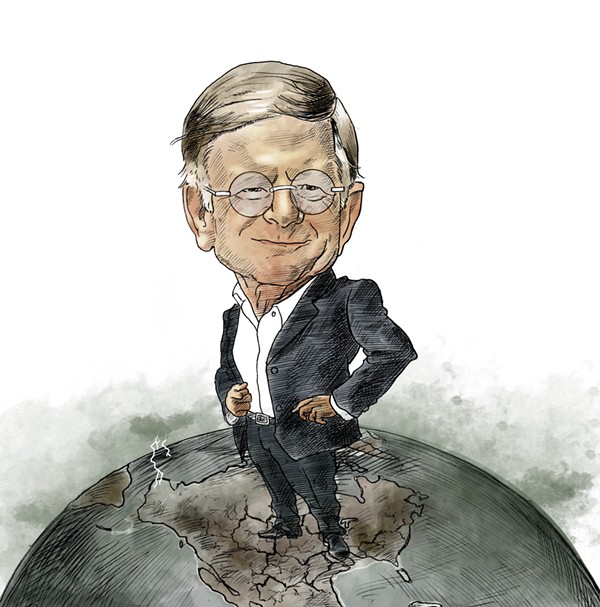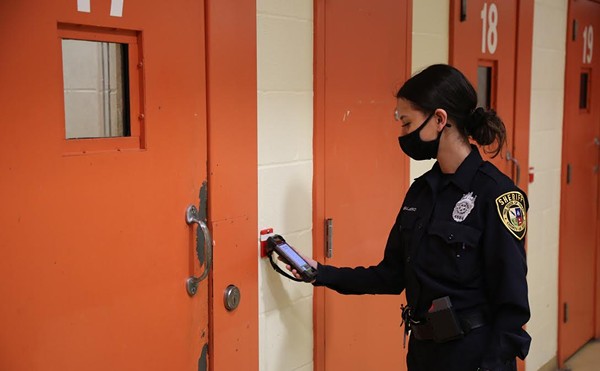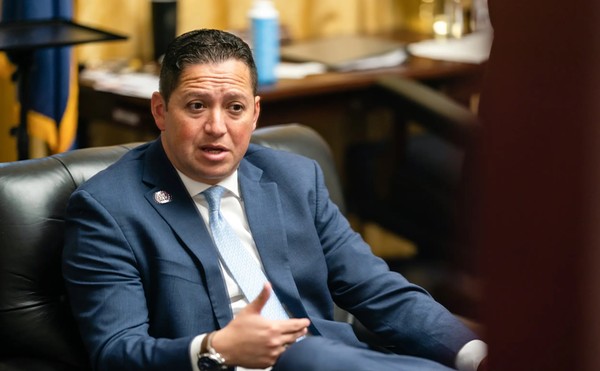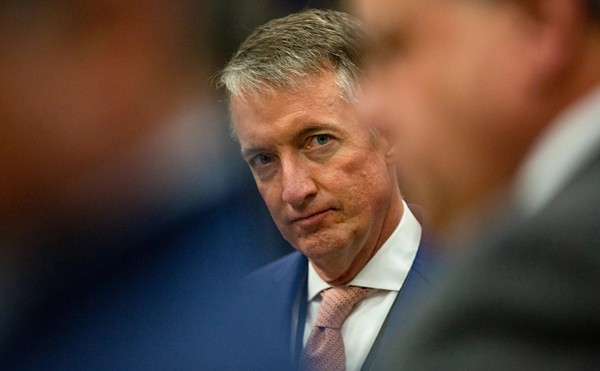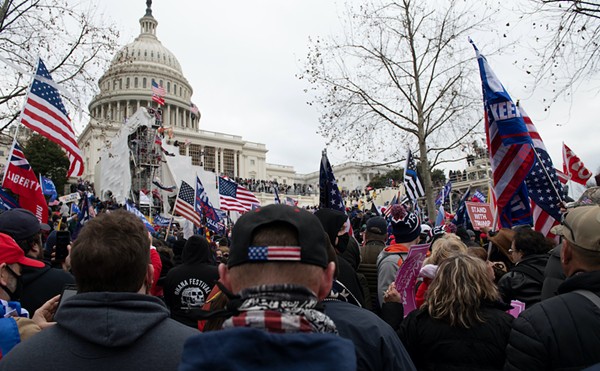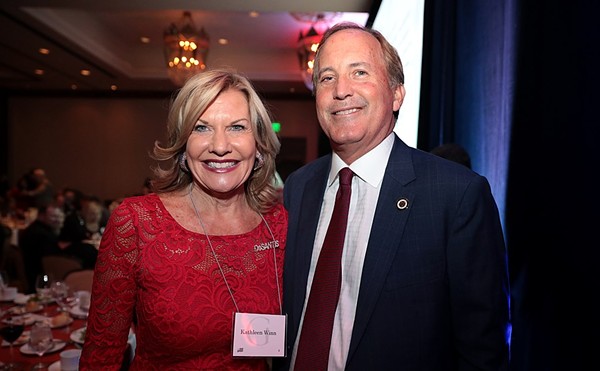Over Memorial Day weekend in 2015, a monster thunderstorm turned the arid Texas Hill Country into a murky swamp. Nonstop downpour had simultaneously tipped the San Marcos and Blanco Rivers over their banks, spilling powerful waves of muddy water throughout the region. In the small town of Wimberley, nestled in the valley between the two rivers, the flood waters devoured city sidewalks, uprooted hundred-year-old cypress trees, ripped homes from their foundation, and killed eleven residents. Thousands became homeless overnight.
A day later, Congressman Lamar Smith, who represents Wimberley’s District in D.C., arrived to survey the damage. Dressed in a blue dress shirt and pressed khakis, the 68-year-old San Antonio native visited the remains of town bridges and shook the hands of business owners whose livelihoods were destroyed by the crashing flood. His dress shoes remained untouched by the muddy debris.
“There’s great tragedy, there’s great devastation,” he told a FOX News reporter that night. “But people are coming back...there’s that sense of the American spirit.”
While the Wimberley floods were the largest in state history, Smith certainly wasn’t a stranger to extreme weather. Over the past few years, severe droughts, blazing wildfires and torrential storms have ravaged the ten counties that lie within his district. Climate researchers have directly linked these drastic weather events to manmade global warming — but Smith has never mentioned its role in the storms that brought him back to walk the flood-damaged streets and dry, dusty creek beds of Central Texas year after year.
In fact, Smith would scoff just a few weeks later when reading a study from the National Oceanic and Atmospheric Administration disproving the idea that global warming had slowed down. That’s because Smith, who chairs the House Committee on Science, Space and Technology, is a climate change skeptic.
Smith may genuinely reject the science behind global warming — or may just be spreading the message his main campaign donors in the oil and gas industry want him to plug. But either way, he’s quickly become a serious threat to the planet’s future.
For the past two years, Smith has led an unforgiving attack on major science organizations that study climate change in the United States — and the lawmakers that use their work to inform policy. In particular, Smith believes that climate researchers have become political pawns, forced by the Obama Administration to create false data to validate Obama’s “burdensome” climate change regulations. Smith has yet to provide evidence backing this theory.
That, however, hasn’t stopped him from subpoenaing every single organization or politician he suspects are in on the conspiracy. So far, he’s issued 24 subpoenas — a number he’s boasted about on multiple occasions. Before Smith’s rule, the science committee had only issued one subpoena since its 1958 inception.
For now, researchers have refused to play along, arguing that his baseless accusations intentionally distract climate scientists from conducting research, thus stunting the country’s understanding of the looming climate crisis. But Smith, wielding an unprecedented amount of power as the chair of the House science committee, has threatened to hold them in contempt of Congress, a move that would further divert scientists from their work.
It’s one thing for a politician to doubt a proven scientific phenomenon. It’s another, scientists argue, for him to muzzle any research that goes against those doubts. (Smith, through his staff, declined repeated requests to be interviewed for this article.)
At a critical time to take action against climate change, one man may have found a way to silence the most crucial answers.
***
Smith has a long history of bending facts to fit his political mood.
In March 1999, Smith, already 12 years into representing Texas in Congress, led a hearing on immigration reform. Smith, sitting behind a clunky microphone, still had a full head of brown hair — a look he still attempts to mimic — and a smooth, wrinkle-free forehead. He didn’t need glasses to read his opening statements.
“How many illegal aliens are living in the United States today?” he asked the quiet room. “Numbers do not tell the whole story.”
He went on to explain how undocumented immigrants are the sole importers of gang activity and drug crimes in America. But there was a hint of sympathy in his remarks. That November, shortly after electoral votes handed George W. Bush the presidency, Smith signed a letter to then-Attorney General Janet Reno asking her to “use discretion” when deporting immigrants, arguing that “unfair” deportations had caused “unjustifiable hardship” for undocumented immigrants.
A decade later, Smith penned a bill that would effectively ban the Obama Administration from using discretion on immigration cases. He called Obama’s policy to prioritize high-risk undocumented immigrants before those who haven’t ever committed a crime a “plot,” despite it being a near duplicate to the plan he endorsed in 1999.
Along with his newfound anti-immigrant stance, Smith is known for spearheading a 2011 bill called the Stop Online Piracy Act, or SOPA. Under the guise of fighting online copyright infringement, SOPA threatened the U.S. with sweeping internet censorship — and was extinguished after months of protest from free speech advocates. SOPA would had benefited companies like Verizon, Time Warner and AT&T, some of Smith’s top campaign donors. AT&T alone has contributed more than $133,000 to Smith’s political campaigns.
Despite SOPA’s failure and his well-recorded disbelief in climate change, Smith was appointed to chair the House Committee on Science, Space and Technology in 2013. Smith, a Christian Scientist, had graduated from Yale with a Bachelor’s Degree in American Studies. In an interview with The Hill, Smith said he was qualified for the chair seat because "long ago and far away, I won the Bausch & Lomb Science Award in high school.”
Then, in early 2015, House Republicans introduced a new rule that would forever shape Smith’s legacy: committee chairs were no longer required to get approval from any committee members before issuing subpoenas.
Smith was officially unleashed.
It began when the NOAA report landed on Smith’s desk, shortly after his return from storm-ravaged Wimberley. Researchers had found that previous reports of global warming slowing down or “pausing” were wrong — the world was still heating up at a concerning rate.
Smith immediately sought to discredit the study, arguing that the timing of the report was sloppily rushed to come out before the United Nations’ upcoming climate summit in Paris. Plus, he added, the Obama Administration had probably forced scientists to skew data to validate its brand-new Clean Power Plan.
He was certain that NOAA’s report was part of a massive conspiracy to validate the Clean Power Plan’s additional regulations on gas, oil and energy companies — the same companies that have donated more than $600,000 to Smith’s political campaigns.
"It was inconvenient for this administration that climate data has clearly showed no warming for the past two decades,” said Smith, in his letter to NOAA.
How could multiple studies that showed a stall in climate change, including the widely-sourced report from the UN Intergovernmental Panel on Climate Change (IPCC), have been wrong? According to NOAA scientists, these past reports had relied on outdated tools for collecting surface temperatures — their new study used an improved methodology to produce more accurate data, factoring in issues that previous researchers ignored.
Even the IPCC admitted their data on a climate change “pause” was flawed. Their numbers were skewed by volcanic eruptions, a decrease in solar activity, aerosols, and regional weather patterns across the largest oceans.
Smith promptly subpoenaed NOAA for documents on its scientists’ data. NOAA declined, since all of this data was already available online — it’s the law. To make it easier, NOAA staffers printed out the public research and handed over to his office. That didn’t cut it for Smith.
“NOAA needs to come clean about why they altered the data to get the results they needed to advance this administration’s extreme climate change agenda,” he demanded.
Which raises a serious concern: Smith doesn’t appear to understand the purpose of scientific research. NOAA scientists didn’t alter the data, they added new information to a growing, global pool of research. This process is a core piece of scientists’ work — comparing past research to current data.
“We don’t rely on one paper to bring us the answers, we rely on thousands. Science needs to be applied under the fundamental curiosity of research,” said Lawrence Krauss, a physicist and professor at Arizona State University. The more research that exists on a topic, the better, he added — even if it ultimately disproves a scientist’s original belief.
“That’s the beauty of science, we force our beliefs to align with science, not the other way around,” Krauss said. “But that scares some people.”
The chairman’s fellow Democratic committee members weren’t pleased with his subpoenaing. In a blistering six-page letter, Representative Eddie Bernice Johnson (D-TX), ranking member of the science committee, called Smith’s so-called investigation a “witch hunt” driven by a partisan agenda.
“The Constitution doesn’t imbue you with the power to sanction a separate and equal branch of government simply because they won’t entertain your baseless conspiracy theories,” she wrote.
Smith charged on, opening another investigation while he waited for NOAA to comply to his liking. This time, however, it was against politicians who were subpoenaing another group of scientists.
But these scientists weren’t employed by the government to inform public policy, like NOAA’s — they were longtime private employees of one of the largest oil conglomerates in the country, ExxonMobil.
Around the same time Smith was grilling NOAA staffers, investigative reporters unearthed internal documents from ExxonMobil that suggested its scientists had known about the dangers of climate change as early as the 1970s. Two attorneys general, Massachusetts’ Maura Healey and New York’s Eric Schneiderman, subpoenaed the oil giant for documents to prove that staff had intentionally hid this information from the public and investors.
Suddenly, the very tool Smith proudly used to pry into NOAA had turned against him — or rather, against a company that had given him $22,270 in campaign donations.
The committee swiftly subpoenaed both attorneys general and eight environmental groups that had provided the AGs with climate change research and legal information, demanding they hand over all emails related to the ExxonMobil investigation. Smith’s reasoning is nearly identical to Rep. Johnson’s argument against the NOAA probe.
“The committee is concerned that these efforts to silence speech are based not on sound legal or scientific arguments,” Smith wrote. “[The subpoenas were an] infringement on the First Amendment rights of American citizens and their ability to fund and conduct scientific research free from intimidation and threats of prosecution.”
Ken Kimmel, president of the Union of Concerned Scientists, one of the targeted organizations, called Smith’s subpoena a “farce.”
“It’s ironic that Representative Smith sees our work as an attempt to stifle scientific discourse, when he has spent the last 10 months harassing National Oceanic and Atmospheric Administration scientists whose research he doesn’t like,” wrote Kimmel in a response to the committee’s subpoenas. In this “request for transparency,” Smith had seemed to reveal his own political — and corporate — biases.
***
Smith’s flip-flopping certainly isn’t unusual in modern-day Congress. Neither is his eagerness to silence scientific data that goes against his public and private allegiances. For decades, politicians stifled research linking lung cancer to smoking to appease their wealthy friends in the tobacco industry. Since 1996, politicians financially backed by the National Rifle Association have blocked any federal funding from going toward gun violence research. And more recently, major organizations like the NFL and Monsanto have been caught tinkering with federal research to cut regulations they don’t like.
What’s different about Smith’s fight is its scope, said Andrew Rosenberg, the director of the Center for Science and Democracy at the Union of Concerned Scientists. UCS is one of the eight organizations subpoenaed for emails between their staff and members of the attorneys general offices. In total, more than 2,000 scientists, researchers, policy experts and legal staff are employed by these organizations. They all are responsible to comply with this subpoena.
“He’s not just targeting one industry like those in the past,” he said. “It’s an entire community, an entire area of science.”
The only comparison, Rosenberg said, is the calculated assault on fetal tissue research coming from another arm of Congress, the House Energy and Commerce Committee. Like Smith, energy committee chair Rep. Marsha Blackburn (R-TN) has justified her attack with a empty suspicion — the belief that Planned Parenthood profits off of fetal tissue, a claim that investigations in a dozen states have debunked. Her only evidence is a collection of discredited undercover videos. But, thanks to the updated House rule, this hasn’t stopped Blackburn from subpoenaing dozens of research organizations for documents, including employees’ bank statements and personal information.
Blackburn and Smith have found a way to use subpoenas to, in essence, hold scientists hostage.
Rosenberg is quick to compare Smith to former Senator Joseph McCarthy, who used his subpoena power to discredit and threaten the livelihoods of thousands of Americans, falsely accusing them of being Communists and Soviet spies. Smith must have also seen himself in the late McCarthy, since he directly relies on McCarthy’s investigations to validate his subpoenas.
“The First Amendment...is not an impenetrable shield to Congressional inquiry,” writes Smith in a letter to UCS, explaining why he’s allowed to demand all communications from the private nonprofit. He then directly cites Watkins v. United States, the Supreme Court case centered on McCarthy’s House on Un-American Activities Committee.
To meet Smith’s subpoena demands, UCS is required to hand over all emails that specifically include the words “climate” and “science.” This would take weeks, said Rosenberg, undermining any research the scientists could otherwise be spending time on, and discourage scientists from publishing future work on climate change, now that they know the tedious consequences.
This tactic, said Kerry Cook, a climate scientist and professor at the University of Texas at Austin, is the entire point of issuing these burdensome subpoenas. This investigation is meant to have a “chilling effect” on all climate science. Cook has spent decades studying global warming — even working for NOAA at one point — and is too familiar with the consequences of studying a “controversial” area of science.
“Climate scientists always keep a low profile, we’re afraid of federal government,” Cook says. “It’s incredibly expensive to deal with a federal investigation. It could ruin a career.”
It’s become such a problem, she said, that a former climate researcher has created a legal defense fund just for climate scientists. And it’s not like the field is financially secure to begin with — Cook said that public funding for climate research, especially in Texas, is scant.
Hindered research, political tip-toeing, a mountain of lawyer’s fees: These scare tactics could easily deter future scientists from studying global warming. It’s a question climate researchers hear far too often: “Is it worth it?”
“If someone is deciding on a research area, are they really going to choose one that is under attack by the government?” Krauss asked. “It’s a tough sell.” Thus, Smith’s subpoenas have the potential to shrink the national pool of climate scientists — slowing crucial research needed to inform policy on climate change.
But this isn’t just about censoring climate change research. If Smith is successful in hindering climate science progress with his subpoenas, he could effectively clear a path for future lawmakers to follow. In short, every committee chair in Congress could use their subpoenaing power to stifle any research that clashes with their political agenda.
“Our democracy relies on an informed public,” Lawrence argued. “It’s now becoming hard to distinguish between scientific issues and political opinions.”
Politicians don’t run for Congress to practice science, he added. Their main priority should be the people they represent. For Smith, those people happen to live in one of the regions most threatened by global warming, making his anti-science crusade particularly troublesome.
“Global warming is affecting entire world, but it’s particularly hurting Texans,” said Ginny Catania, a geology professor at the University of Texas. Catania's been studying the world's shrinking ice sheets and rising sea level for several years, and can easily see how these larger changes affect her home state.
From Hurricane Ike’s devastating floods along the Gulf Coast to Bexar County’s baseball-sized hail storm just earlier this year, it’s nearly impossible to ignore the shifting weather across the Texas.
And they’re expected to only increase. Most coastlines in Texas are 10 centimeters away from sea level, said Catania. If current studies are right (don’t ask Smith to confirm), oceans should rise by at least 1 meter, or 3 feet, by the end of the 21st century, meaning Port Arthur, Galveston, Corpus Christi and other cities along the Gulf Coast could be marshlands in 80 years.
Meanwhile, the state’s many oil, gas and coal-fueled energy companies continue churning out carbon dioxide, the very chemical responsible for widespread warming — making Texas the country’s top contributor to climate change.
These companies include San Antonio’s NuStar Energy, the number one campaign donor to Smith’s most recent run, Honeywell, another Smith backer who opened a new Liquefied Natural Gas production facility in Brownsville last year, and Valero Energy, a San Antonio-based oil refiner who’s given Smith nearly $80,000 in campaign donations throughout his career.
***
Smith’s dismissal of a destructive climate shift that is visibly playing out across his state isn’t just reckless, said Luke Metzger, director of Environment Texas. It’s immoral.
“It’s preposterous that the chair of the science committee doesn't accept evidence of climate change, especially coming from Texas researchers,” Metzger said. “It goes against his role as a representative to look out for the safety of the people he represents. He’s neglecting them.”
The polls say otherwise. On November 8, Smith’s constituents re-elected him to represent District 21 for the 30th year in a row. Smith has yet to win a general election by less than 60 percent of the vote.
But, Metzger added, that’s because Smith’s district is the result of Texas’ 2003 redistricting plan that shifted Texas’ US House delegation to a Republican majority. In a dependably conservative district, it’s almost guaranteed that Smith will never lose an election
“It would take a huge amount of money to unseat him,” Metzger said. “In the meantime, drought, flooding, wildfires —the effects of climate change — are costing Texans their lives, property and jobs.”
This May, on the anniversary of the 2015 floods, Wimberley residents met at the banks of the Blanco River to stick handmade prayer flags in the mud. Crumbling foundation and piles of water-damaged, forgotten appliances still littered the banks of the calm river. Some of the wealthier victims of the flood had rebuilt their vacation homes along the Blanco River. But not all were so lucky.
"Just take a look around my neighborhood now," Antonio Monterroso, who lived just east of Wimberley, told Spectrum News. "It was bad at that time; now it is pretty much destroyed."
Monterroso had just put his house on the market before an October flood destroyed the months’ repair he put into the home after the Memorial Day storm. He was back to square one — and was feeling hopeless.
"It disappoints us that our authorities just forget us," he said. "They don't do anything for us, pretty much, around here. It may change."
Meanwhile, in Washington D.C., his representative, Lamar Smith had just become the first member of Congress to endorse a longshot candidate for president. It made sense; the two had a lot in common. Like Smith, Donald Trump believed climate change was a “hoax.” And, like Smith, he was about to have an unrestricted amount of power.

